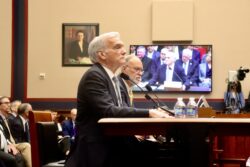The war in Iraq and the crisis in Darfur dominate the minds of 18 to 24 year olds across the country, according to a new Harvard University survey.
John Della Volpe, Director of the Institute of Politics (IOP) at the Kennedy School of Government, said that 50 percent of all respondents to the 12th Biannual Youth Survey on Politics and Public Service identified “Iraq,” “the war,” the “War on Terror” or “domestic security” as their greatest concern.
College Democrats President Or Skolnik (COL ’08) said that young people take a more active interest in U.S. policy because they are more directly affected by it.
“We have very much at stake,” he said. “We are the ones who will be dealing with this war for the rest of our lives.”
The war in Iraq is not the only issue on young people’s minds, though; Della Volpe was surprised to note that that the genocide in Darfur is the second-highest priority for American youth.
“Somewhat surprising[ly],” he said, “we saw that Darfur was the second most important foreign policy priority.”
College Republicans Chairman Joe Hack (COL ’09) said that among GUCR members, the war on terror would be the primary source of concern.
“For our club, obviously war on terror is the number one priority,” he said.
“I think secondary issues, you’d get a lot of answers.”
The poll also found that Bush’s approval rate continues to drop among youth and that foreign policy issues dominate young people’s concerns, with economic issues receiving far less attention.
“Right now, the economy is not very important [to young people],” David King, Director of Research at IOP, said. “Domestic issues tend to be viewed through a lens of morality.”
Della Volpe said that traditional left-right ideological issues have become less important in recent years, and that religious centrists, a new group most concerned with the moral direction of the country, will tend to support such issues as universal health care and the environment while opposing other traditionally liberal policies, such as gay marriage.
Despite the commonly held belief that young people support the legalization of gay marriage, only 53 percent of the people polled did not feel that consensual homosexual relations are morally wrong.
The study also looked at perspectives on the 2008 election, and found that Senator Barack Obama (D-Ill.) and former New York City Mayor Rudolph Giuliani are the favorite candidates among young Democrats and young Republicans, respectively.
“Young Republicans pretty much mirror old Republicans across the country,” Della Volpe said. But unlike their young counterparts, adult Democrats favor New York Senator Hillary Clinton over Obama, according to a recent Gallup Poll, and Obama’s lead among non-college students is significantly lower than among college and university students. Della Volpe attributed this asymmetry to Obama’s success with Facebook.com groups.
King said that over the seven years that Harvard has been conducting the survey, youth attitudes toward politics have changed dramatically.
“Today young people are remarkably cynical about politics, but they see its relevance in their daily lives,” he said. This has led to more youth involvement and participation in elections, which candidates have not yet learned to recognize, he said.
“Overall, campaigns in America have not been thinking about how to target, how to find, how to reach out to young people,” he said.



